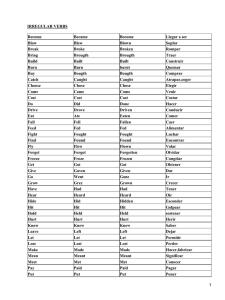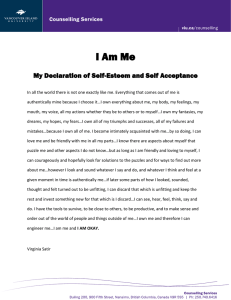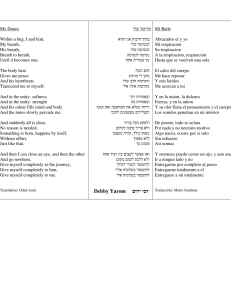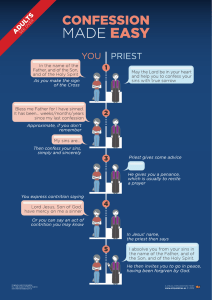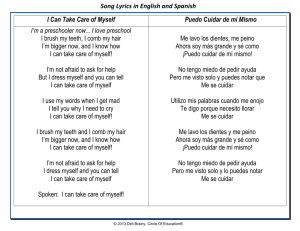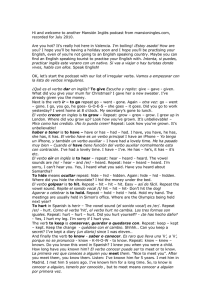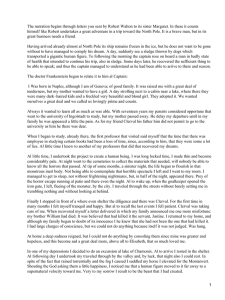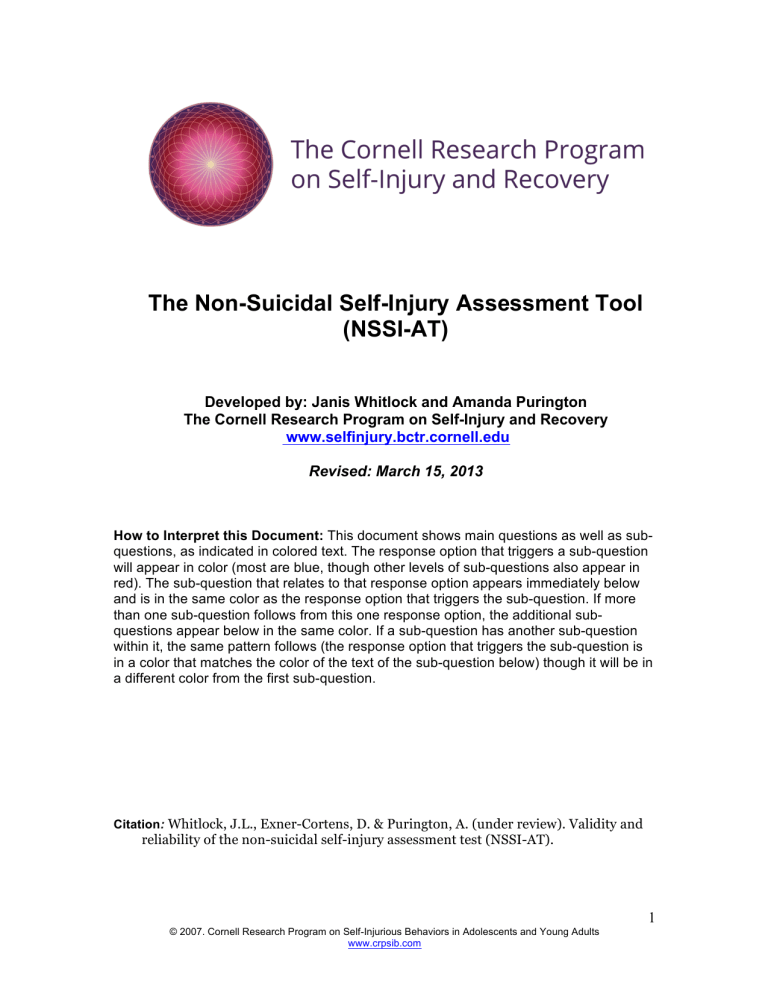
The Non-Suicidal Self-Injury Assessment Tool (NSSI-AT) Developed by: Janis Whitlock and Amanda Purington The Cornell Research Program on Self-Injury and Recovery www.selfinjury.bctr.cornell.edu Revised: March 15, 2013 How to Interpret this Document: This document shows main questions as well as subquestions, as indicated in colored text. The response option that triggers a sub-question will appear in color (most are blue, though other levels of sub-questions also appear in red). The sub-question that relates to that response option appears immediately below and is in the same color as the response option that triggers the sub-question. If more than one sub-question follows from this one response option, the additional subquestions appear below in the same color. If a sub-question has another sub-question within it, the same pattern follows (the response option that triggers the sub-question is in a color that matches the color of the text of the sub-question below) though it will be in a different color from the first sub-question. Citation: Whitlock, J.L., Exner-Cortens, D. & Purington, A. (under review). Validity and reliability of the non-suicidal self-injury assessment test (NSSI-AT). 1 © 2007. Cornell Research Program on Self-Injurious Behaviors in Adolescents and Young Adults www.crpsib.com A. Primary and secondary NSSI characteristics 1. Have you ever done any of the following with the purpose of intentionally hurting 1 yourself? o Severely scratched or pinched with fingernails or other objects to the point that bleeding occurs or marks remain on the skin o Cut wrists, arms, legs, torso or other areas of the body o Dripped acid onto skin o Carved words or symbols into the skin o Ingested a caustic substance(s) or sharp object(s) (Drano, other cleaning substances, pins, etc.) o Bitten yourself to the point that bleeding occurs or marks remain on the skin o Tried to break your own bone(s) o Broke your own bone(s) o Ripped or torn skin o Burned wrists, hands, arms, legs, torso or other areas of the body o Rubbed glass into skin or stuck sharp objects such as needles, pins, and staples into or underneath the skin (not including tattooing, body piercing, or needles used for medication use) o Banged or punched objects to the point of bruising or bleeding o Punched or banged oneself to the point of bruising or bleeding o Intentionally prevented wounds from healing o Engaged in fighting or other aggressive activities with the intention of getting hurt 2. Are there any other ways that you have physically hurt or mutilated your body with the purpose of intentionally hurting yourself? o Yes; please specify o No B. Functions 3. How true are the following statements about why you hurt yourself? Please select the most accurate response. I hurt myself… o o o o o o Strongly Disagree (1) Somewhat Disagree (2) Somewhat Agree (3) Strongly Agree (4) …to feel something …because my friends hurt themselves …as a self-punishment or to atone for sins …to get a rush or surge of energy …to deal with frustration …to cope with uncomfortable feelings (e.g., depression or 1 Note: It is not advisable to use a behavior-based NSSI screening item with secondary school students. Single item measures, while slightly less effective, are preferred in this population. The replacement measure we use is, “Have you ever hurt your body (e.g. cut, carve, burn, scratch really hard, punch) on purpose but without wanting to end your life? 2 © 2007. Cornell Research Program on Self-Injurious Behaviors in Adolescents and Young Adults www.crpsib.com o o o o o o o o o o o o o o o anxiety) …in hopes that someone would notice that something is wrong or that so others will pay attention to me …so I do not hurt myself in other ways …because it feels good …to deal with anger …to get control over myself or my life …to shock or hurt someone …to avoid committing suicide …because I get the urge and cannot stop it …to relieve stress or pressure …to change my emotional pain into something physical …because of my self-hatred …because I like the way it looks …as a way to practice suicide …as an attempt to commit suicide Other, please describe 4. In the above question, you indicated that you intentionally hurt yourself with the intention of practicing or committing suicide. Was practicing or attempting suicide the primary reason you intentionally hurt yourself? o Yes o No o I am not sure If only these items are indicated or if #4 is answered yes, we exclude these individuals from the NSSI track and recode as no NSSI C. Recency and Frequency (and age of cessation) 5. The following questions ask about your experience with intentionally hurting yourself. We know that this can be a difficult issue to think and talk about. Please note that there are web links on the bottom of every page and at the end of the survey with contact information you can use if you feel like you want to talk with someone. There is also a distraction button you can use to take a break if you start to feel triggered or at all uncomfortable. The information you provide about this topic will be used to help others who intentionally hurt themselves. It will take about 15 more minutes to complete this survey. Thank you in advance for your time and honesty. ~~~~~~~~ When was the last time you intentionally hurt yourself in one of the ways listed in the previous question? o Less than 1 week ago o Between 1 week and 1 month ago o Between 1 and 3 months ago o Between 3 and 6 months ago o Between 6 months and 1 year ago o Between 1 and 2 years ago o More than 2 years ago 3 © 2007. Cornell Research Program on Self-Injurious Behaviors in Adolescents and Young Adults www.crpsib.com 6. How likely are you to intentionally hurt yourself again? o Very likely o Somewhat likely o Not sure o Somewhat unlikely o Very unlikely 7. How old were you the last time you self-injured? 8. Approximately on how many total occasions have you intentionally hurt yourself? o Only once o 2-3 times o 4-5 times o 6-10 times o 11-20 times o 21-50 times o More than 50 times 9. If you had to estimate the total number of occasions you have intentionally hurt yourself, what would you estimate? D. Age of onset and cessation 10. How old were you the first time you intentionally hurt yourself? E. Wound Locations 11. On what areas of your body have you intentionally hurt yourself? o Wrists o Hands o Arms o Fingers o Calves or ankles o Thighs o Stomach or chest o Back o Buttocks o Head o Feet o Face o Lips or tongue o Shoulders or neck o Breasts o Genitals or rectum o Other; please specify F. Initial Motivations 12. Which of the following descriptions best describes your motivations for first intentionally hurting yourself? (Please check all that apply) o A friend suggested that I try it o I read about it on the Internet and decided to try it o I saw it in a movie / on television or read about it in a book and decided to try it o It seemed to work for other people I know o It seemed to work for celebrities I have heard of 4 © 2007. Cornell Research Program on Self-Injurious Behaviors in Adolescents and Young Adults www.crpsib.com o o o o o o o o o o o o o G. I accidentally discovered it - I had never heard of it or seen it before It was part of a dare I did it because I had friends who did it and I wanted to fit in I wanted to be part of a group I wanted to shock or hurt someone I was upset and decided to try it I wanted someone to notice me and / or my injuries It felt good I was angry at someone else I was angry with myself I was drunk or high Other; please specify I cannot remember Severity 13. Have you ever intentionally hurt yourself more severely than you expected? o Yes o No 14. Have you ever intentionally hurt yourself so badly that you should have been seen by a medical professional (even if you were not)? o Yes o No 15. How many times have you intentionally hurt yourself more severely than you expected? o 1 o 2-3 o 4-5 o More than 5 16. Were you under the influence of drugs or alcohol in any instance that you hurt yourself more severely than you expected? o Yes o No 17. Please briefly describe one specific thing you have done to intentionally hurt yourself. 18. Have you ever sought medical treatment (not therapy) for any of the physical injuries you intentionally caused? o Yes o No 19. How often have you intentionally hurt yourself while you are in your most active phase(s)? o Every day o 2-3 times a week o Once a week o 1-3 times a month o Once every few months o About once a year o Once every two years or more years 5 © 2007. Cornell Research Program on Self-Injurious Behaviors in Adolescents and Young Adults www.crpsib.com 20. During the period(s) in which you most actively hurt yourself, what was the longest interval of time during which you did not hurt yourself? o Less than a week o Less than a month o 1-3 months o 4-6 months o 7-12 months o More than a year H. Practice Patterns 21. How true are each of the following statements for you? Strongly disagree (1) Somewhat disagree (2) Neither agree nor disagree (3) Somewhat agree (4) Strongly agree (5) Does not apply I always intentionally hurt myself in private I sometimes intentionally hurt myself in the presence of others I sometimes let other people intentionally hurt me physically I have intentionally physically hurt another person I have a regular routine I follow when I intentionally hurt myself I have a particular place / room I prefer to be in when I intentionally hurt myself I tend to go through periods in which I intentionally hurt myself, then periods in which I do not, and this pattern repeats 6 © 2007. Cornell Research Program on Self-Injurious Behaviors in Adolescents and Young Adults www.crpsib.com I. Habituation and Perceived Life Interference 22. How true are each of the following statements for you? Strongly disagree (1) Somewhat disagree (2) Neither agree nor disagree (3) Somewhat agree (4) Strongly agree (5) Does not apply I have had to intentionally hurt myself more deeply and / or in more places on my body over time to get the same effect I want to stop intentionally hurting myself altogether, but have trouble stopping I will not need help from someone to stop intentionally hurting myself altogether - I can do it on my own Nothing else works as well as intentionally hurting myself to calm me down or give me relief I have had to fight the urge to start intentionally hurting myself again When I have the urge to intentionally hurt myself it is easy to control it 23. The fact that I intentionally hurt myself is a problem in my life. o Strongly disagree o Somewhat disagree o Neither agree nor disagree o Somewhat agree o Strongly agree 24. The fact that I intentionally hurt myself interferes with: (Please check all that apply) o Relationships which are important to me o My ability to complete school or work obligations o My ability to take care of myself (eat right, exercise, etc.) o My ability to engage in hobbies or things that I like to do o My self-worth / self-esteem 7 © 2007. Cornell Research Program on Self-Injurious Behaviors in Adolescents and Young Adults www.crpsib.com o o o J. The clothing I wear Other; please specify It does not interfere with my life in any way NSSI Disclosure 25. Does the following statement describe your experience? Someone knows that I intentionally hurt myself and has had a conversation with me about it. o True o False 26. Who knows about it and has talked with you about it? o Parent or custodial guardian o Sibling o Friend o Significant other (boyfriend, girlfriend, or spouse / partner) o Other relative o Teacher o Coach o Adult friend o Therapist o Physician o Religious or spiritual leader (e.g., priest, pastor, rabbi) o Health care provider o Other; please specify 27. (For each selected) Did you initiate the conversation or did they? o I initiated the conversation o They initiated the conversation 28. (For each selected) Have the conversation(s) you've had with this person been helpful? o Yes o No o I do not know 29. Does the following statement describe your experience? One or more people know or suspect that I intentionally hurt myself but have not had a conversation with me about it. o True o False o Possibly, but I do not know 30. Who knows / suspects about it and has not talked with you about it? (Please check all that apply) o Parent or custodial guardian o Sibling o Friend o Significant other (boyfriend, girlfriend, or spouse / partner) o Other relative o Teacher o Coach o Adult friend o Therapist o Physician o Religious or spiritual leader (e.g., priest, pastor, rabbi) 8 © 2007. Cornell Research Program on Self-Injurious Behaviors in Adolescents and Young Adults www.crpsib.com o o Health care provider Other; please specify 31. (For each selected) Do you wish this person would talk with you about it? o Yes o No o I do not know 32. Does the following statement describe your experience? No one knows that I intentionally hurt myself. o True o False K. NSSI Treatment Experiences 33. Have you ever gone to therapy because you intentionally hurt yourself? o Yes o No o Intentionally hurting myself was part of the reason I went but not all of it 34. Did someone else insist you go to therapy or did you decide to go on your own? o Someone else insisted that I go o I went on my own o Other; please specify 35. If you have received therapy for any reason, did you intentionally hurt yourself after your treatment ended? o Yes, I did intentionally hurt myself after treatment o No, I completely stopped intentionally hurting myself after receiving treatment o I have seen multiple therapists about intentionally hurting myself and some helped me and some did not 36. In your opinion, how helpful was therapy in helping you to stop intentionally hurting yourself? o Very helpful o Helpful o Somewhat helpful o Not at all helpful 37. What in your experience with therapy (even if your experience with intentionally hurting yourself was not the focus of your therapy) has been most helpful in helping you to understand or control intentionally hurting yourself? L. Personal Reflections and Advice 38. Looking back, how has your experience with intentionally hurting yourself impacted your life, both positively and negatively? (Please check all that apply) o I still cannot talk about it and sometimes even thinking about it is difficult o The lasting marks / scars are constant reminders of a bad / rough time in my life o I am now able to help others who intentionally hurt themselves o In thinking / discussing my experience around intentionally hurting myself, I have learned a lot about myself and because of it have mentally / emotionally grown o My scars are my battle wounds - I made it through 9 © 2007. Cornell Research Program on Self-Injurious Behaviors in Adolescents and Young Adults www.crpsib.com o Discussion of my experience around intentionally hurting myself has helped me grow closer to the people I care about o The remaining marks / scars are a source of embarrassment for me o It really did not impact my life much at all o Other; please specify 39. What do you think is important for people who want to understand and help those who intentionally hurt themselves to know? 10 © 2007. Cornell Research Program on Self-Injurious Behaviors in Adolescents and Young Adults www.crpsib.com
